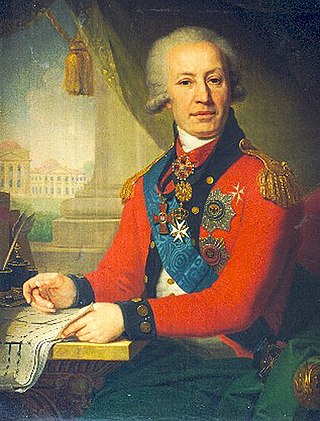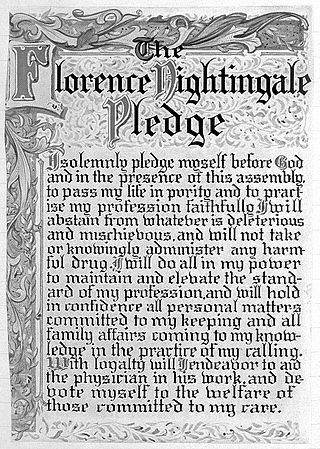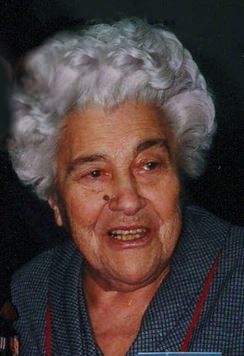
A registered nurse (RN) is a nurse who has graduated or successfully passed a nursing program from a recognized nursing school and met the requirements outlined by a country, state, province or similar government-authorized licensing body to obtain a nursing license. An RN's scope of practice is determined by legislation, and is regulated by a professional body or council.

The white coat ceremony (WCC) is a ritual in some schools of medicine and other health-related fields that marks the student's transition from the study of preclinical to clinical health sciences. At some schools, where students begin meeting patients early in their education, the white coat ceremony is held before the first year begins. It is an example of a matriculation. The ritual is a recent invention, first being popularized in the 1990s.
Nurse education consists of the theoretical and practical training provided to nurses with the purpose to prepare them for their duties as nursing care professionals. This education is provided to student nurses by experienced nurses and other medical professionals who have qualified or experienced for educational tasks, traditionally in a type of professional school known as a nursing school. Most countries offer nurse education courses that can be relevant to general nursing or to specialized areas including mental health nursing, pediatric nursing and post-operatory nursing. Courses leading to autonomous registration as a nurse typically last four years. Nurse education also provides post-qualification courses in specialist subjects within nursing.

International Nurses Day (IND) is an international day observed around the world on 12 May each year, to mark the contributions that nurses make to society.

Most professional militaries employ specialised military nurses or nursing sisters. They are often organised as a distinct nursing corps. Florence Nightingale formed the first nucleus of a recognised Nursing Service for the British Army during the Crimean War in 1854. In the same theatre of the same war, Professor Nikolai Ivanovich Pirogov and the Grand Duchess Yelena Pavlovna originated Russian traditions of recruiting and training military nurses – associated especially with besieged Sevastopol (1854–1855). Following the war Nightingale fought to institute the employment of women nurses in British military hospitals, and by 1860 she had succeeded in establishing an Army Training School for military nurses at the Royal Victoria Military Hospital in Netley, Hampshire, England.

The Florence Nightingale Faculty of Nursing, Midwifery & Palliative Care is an academic faculty within King's College London. The faculty is the world's first nursing school to be continuously connected to a fully serving hospital and medical school. Established on 9 July 1860 by Florence Nightingale, the founder of modern nursing, it was a model for many similar training schools through the UK, Commonwealth and other countries for the latter half of the 19th century. It is primarily concerned with the education of people to become nurses and midwives. It also carries out nursing research, continuing professional development and postgraduate programmes. The Faculty forms part of the Waterloo campus on the South Bank of the River Thames and is now one of the largest faculties in the university.
The William F. Connell School of Nursing (CSON) is the professional nursing school at Boston College in Chestnut Hill, Massachusetts.

A nursing pin is a type of badge, usually made of metal such as gold or silver, which is worn by nurses to identify the nursing school from which they graduated. They are traditionally presented to the newly graduated nurses by the faculty at a pinning ceremony as a symbolic welcome into the profession. Most pins have a symbolic meaning, often representing the history of the nursing program for that school of nursing.

The Nightingale Pledge, named in honour of Florence Nightingale, is a modified version of the Hippocratic Oath. Lystra Gretter and a Committee for the Farrand Training School Grace for Nurses in Detroit, Michigan created the pledge in 1893. Gretter, inspired by the work of Nightingale, the founder of modern nursing, credited the pledge to the work of her committee, but was herself considered "the moving spirit behind the idea" for the pledge.

Lystra Eggert was born in September 1858 in Bayfield, Canada West. She attended grade school in the Bayfield area until 1866 when her family moved to Greensboro, North Carolina. It was here that Lystra began attending private schools. When she was finished with school, at the age of 19, she married a man by the name of John Birney Gretter, where she then took the name, Lystra Gretter. Her husband, John, was approximately twenty six years older and a veteran of the Confederate Army led by Robert E. Lee. In the year 1881, Lystra and John welcomed their first and only daughter, Mary.

A nurse's cap or nursing cap is part of the female nurse's uniform, introduced early in the history of the profession. The cap's original purpose was to keep the nurse's hair neatly in place and present a modest appearance. Male nurses do not wear caps.
The word "nurse" originally came from the Latin word "nutrire", meaning to suckle, referring to a wet-nurse; only in the late 16th century did it attain its modern meaning of a person who cares for the infirm.

Nursing is a profession within the healthcare sector focused on the care of individuals, families, and communities so they may attain, maintain, or recover optimal health and quality of life. Nurses may be differentiated from other healthcare providers by their approach to patient care, training, and scope of practice. Nurses practice in many specialties with differing levels of prescription authority. Nurses comprise the largest component of most healthcare environments; but there is evidence of international shortages of qualified nurses. Nurses collaborate with other healthcare providers such as physicians, nurse practitioners, physical therapists, and psychologists. There is a distinction between nurses and nurse practitioners; in the U.S., the latter are nurses with a graduate degree in advanced practice nursing, and are permitted to prescribe medications unlike the former. They practice independently in a variety of settings in more than half of the United States. Since the postwar period, nurse education has undergone a process of diversification towards advanced and specialized credentials, and many of the traditional regulations and provider roles are changing.
The procedures and traditions surrounding academic graduation ceremonies differ around the world.
The Hunter-Bellevue School of Nursing (HBSON) is the nursing school of Hunter College, a public university that is a constituent organization of the City University of New York (CUNY). It is located on the Brookdale Campus, at East 25th Street and 1st Avenue in Kips Bay, near Bellevue Hospital. The school is the flagship nursing program for CUNY.
The Florence Nightingale Foundation (FNF) is a charity organization in the United Kingdom that provides scholarships to nurses, midwives, and other health professionals while serving as a living memorial to the work of Florence Nightingale.
The Central Philippine University College of Nursing, also known as CPU CON or CPU College of Nursing, is a department within Central Philippine University, a private university in Iloilo City, Philippines. It was established in 1906 as the Union Mission Hospital Training School for Nurses as the first nursing school in the Philippines.

Alpha Tau Delta (ΑΤΔ) is a professional fraternity for students and industry professionals in the nursing fields. It was founded in 1921 at University of California, Berkeley as Alpha Tau.

Rachela Hutner was a pioneering Polish nurse who was instrumental in the development of the post-World War II nursing profession of her country, pressing for educational requirements and standards. She received numerous awards and honors, including the Knight's Cross and Commander's Cross with the Star of the Order of Polonia Restituta from Poland and the international Florence Nightingale Medal.















